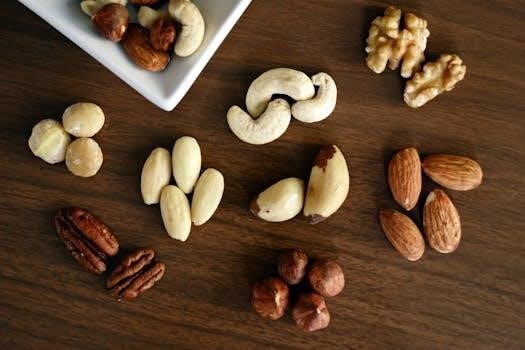
Overview of the Paddison Program
The Paddison Program is a holistic‚ science-supported strategy to reduce inflammation. It involves a plant-based diet‚ exercise‚ stress reduction‚ and supplements. The program aims to alleviate rheumatoid arthritis symptoms and improve gut health systematically.

Core Principles of the Paddison Program
The Paddison Program operates on several core principles aimed at reversing rheumatoid arthritis (RA) symptoms. Firstly‚ it emphasizes a plant-based‚ elimination diet to identify and remove trigger foods that exacerbate inflammation. Gut health is another cornerstone‚ focusing on healing leaky gut and addressing bacterial overgrowth. The program promotes achieving an alkaline balance within the body through specific food choices. Stress reduction techniques‚ including mindfulness and exposure to nature‚ are integral to the program’s success. Regular‚ appropriate exercise is encouraged to reduce inflammation and improve overall well-being. Supplementation is used strategically to enhance antioxidant status and support bodily functions. The program is highly individualized‚ recognizing that each person’s response may vary. The stepwise approach ensures sensitivities are identified‚ and lifestyle adjustments are made. It incorporates science-backed strategies to reduce disease activity.
Dietary Guidelines of the Paddison Program
The Paddison Program’s dietary guidelines involve an elimination diet to identify food sensitivities. It is primarily a plant-based approach focused on reducing inflammation. This diet also emphasizes gut health.
Elimination Phase
The elimination phase of the Paddison Program is the initial and most restrictive part of the dietary protocol. It involves removing many foods to reduce inflammation and identify potential triggers for rheumatoid arthritis symptoms. The goal is to provide the gut with a chance to heal and reset‚ reducing the overall disease activity.
During this phase‚ the diet mainly consists of a limited selection of easily digestible‚ low-allergen foods. This may include specific vegetables‚ such as leafy greens and certain non-starchy options‚ along with a few carefully chosen grains like white rice. Green juices‚ especially celery juice‚ are often incorporated to aid in cleansing and detoxification.
This highly restrictive period aims to minimize immune system activation and reduce inflammation. It’s a cornerstone of the program‚ designed to provide fast relief and prepare the body for the next phase.
Reintroduction Phase
Following the elimination phase‚ the reintroduction phase of the Paddison Program involves systematically introducing foods back into the diet one at a time. This careful process aims to identify individual food sensitivities and triggers that may exacerbate rheumatoid arthritis symptoms. Each food is reintroduced individually‚ with close monitoring of the body’s response.
The reintroduction process is crucial for personalizing the diet and avoiding unnecessary restrictions. By carefully observing how the body reacts to each food‚ individuals can create a tailored eating plan that minimizes inflammation and supports long-term health. If a food causes a negative reaction‚ it is removed from the diet.
This phase requires patience and meticulous record-keeping to accurately identify problematic foods. The goal is to expand the diet gradually while maintaining symptom control and optimizing overall well-being.

Foods Recommended in the Paddison Program
The Paddison Program emphasizes plant-based foods like leafy greens and seaweed. These are mineral powerhouses that provide essential nutrients. Coconut water‚ turmeric‚ and ginger are beneficial for overall health.
Alkaline Balance and Food Lists
The Paddison Program addresses the importance of alkaline balance within its dietary framework. Many online resources provide acid-alkaline food lists‚ but these can be conflicting. The program provides a video and supporting information to guide individuals in understanding alkaline balance effectively.
This educational content helps users navigate the complexities of food lists and make informed dietary choices. The focus is on achieving an optimal internal environment to support the reduction of inflammation and symptom relief associated with rheumatoid arthritis.
The program’s resources are designed to clarify common misconceptions and promote a balanced‚ plant-based approach that aligns with its core principles. By understanding the principles of alkalinity‚ individuals can better tailor their diet to support overall well-being.
Foods to Avoid in the Paddison Program
The Paddison Program recommends avoiding foods high in saturated fats. This is because they can increase the risk of heart disease and other health problems. These guidelines are crucial for overall well-being.
Saturated Fats and Dairy Alternatives
The Paddison Program emphasizes the avoidance of saturated fats due to their potential to increase the risk of heart disease and stroke‚ posing serious health problems. Dairy products‚ traditionally high in saturated fats‚ are therefore excluded from the program’s dietary guidelines. This raises the question of suitable dairy alternatives.
The program often includes soy milk and oat milk as acceptable substitutes‚ allowing individuals to enjoy milk-like beverages without the detrimental effects of saturated fats. These alternatives are carefully considered within the Paddison Program to ensure they align with the goals of reducing inflammation and promoting overall well-being. The emphasis on plant-based options extends to finding replacements for other dairy-derived foods‚ ensuring a comprehensive approach to minimizing saturated fat intake while adhering to the program’s principles.
Therefore‚ understanding the role of saturated fats and identifying appropriate dairy alternatives is a crucial aspect of successfully implementing the Paddison Program.
The Paddison Program and Gut Health
The Paddison Program builds on a vegan framework with modifications to improve gastrointestinal health and intestinal barrier repair. It delivers science-backed guidelines for diet to give inflammation relief.
Leaky Gut and Bacterial Overgrowth
The Paddison Program addresses leaky gut and bacterial overgrowth‚ which are relevant for those who don’t see relief initially. Some individuals may experience more severe gut issues. The program includes steps to improve gut health and manage rheumatoid arthritis symptoms systemically. It’s important to note that systemic rheumatoid arthritis affects the whole body‚ and its reversal involves systemic changes.
The program’s dietary process‚ which includes an elimination plant-based diet‚ is designed to heal the gut. The initial phase often involves a veggie juice diet without fruit sugar. Green juice is recommended for pain relief‚ emphasizing the program’s focus on gut health improvement.
The Paddison Program integrates science-supported strategies to reduce inflammation and improve gut health. These strategies encompass diet‚ exercise‚ mindfulness‚ stress reduction‚ and supplementation to improve the body’s antioxidant status and overall well-being.

Other Components of the Paddison Program
Beyond diet‚ the Paddison Program includes exercise‚ mindfulness‚ and stress reduction techniques. Supplementation to improve antioxidant status and exposure to nature are also key components of this holistic approach.
Exercise and Stress Reduction
The Paddison Program emphasizes exercise and stress reduction as crucial components alongside diet for managing rheumatoid arthritis. Regular physical activity helps reduce inflammation and improve overall well-being‚ complementing the dietary changes. Incorporating mindfulness practices aids in managing stress‚ a known trigger for RA flares.
The program advocates for gentle exercises initially‚ gradually increasing intensity as symptoms improve. Stress reduction techniques such as meditation‚ deep breathing‚ and yoga are encouraged. These combined strategies work synergistically with the plant-based diet to promote healing and reduce disease activity. The program encourages exposure to nature and other science-supported strategies.
By addressing both physical and mental well-being‚ the Paddison Program aims to provide a comprehensive approach to managing RA symptoms and improving quality of life. The integration of these components is essential for achieving long-term success.

Potential Challenges and Troubleshooting
Some individuals following the Paddison Program may face challenges. This includes unwanted weight loss or a lack of initial symptom relief. Addressing these issues requires careful troubleshooting and adjustments to the program.
Weight Loss Concerns
Unintentional weight loss is a potential challenge reported by some individuals following the Paddison Program. This can be concerning‚ especially after dedicated effort. It’s crucial to address this issue thoughtfully to avoid unhealthy compensatory eating. The program’s initial phases‚ emphasizing vegetable juices and a limited range of foods‚ may contribute to this.
Individuals experiencing weight loss should carefully reassess their caloric intake‚ ensuring it meets their individual needs. Consider gradually incorporating calorie-dense‚ yet program-compliant‚ foods like sweet potatoes or avocado in moderation. Monitoring overall energy levels and adjusting food intake accordingly is important. If concerns persist‚ consulting a nutritionist familiar with the Paddison Program is recommended. They can provide personalized guidance to maintain a healthy weight while adhering to the program’s principles‚ ensuring adequate nutrition and continued progress in managing rheumatoid arthritis symptoms. Avoiding extreme measures is vital.
Scientific Basis and Criticism
The Paddison Program’s foundation rests on scientific evidence related to diet‚ exercise‚ and stress reduction’s impact on rheumatoid arthritis (RA). It leverages research highlighting the anti-inflammatory effects of plant-based diets and the gut-health connection in autoimmune diseases. The program’s creator‚ Clint Paddison‚ emphasizes his study of scientific literature in developing the program.
However‚ the program has faced criticism‚ with some labeling it as “quackery.” Skeptics argue that anecdotal evidence may overshadow rigorous scientific validation. Concerns have also been raised regarding the program’s promotion while the creator was reportedly using conventional medications like methotrexate (MTX). Critics advocate for more controlled studies to validate the program’s efficacy independently. It’s essential for individuals to weigh the available evidence and consult with healthcare professionals before adopting any RA treatment approach.
 zen the art of archery pdf
zen the art of archery pdf  fruit of the spirit pdf
fruit of the spirit pdf  norwegian sun deck plan pdf
norwegian sun deck plan pdf  free disc personality test pdf
free disc personality test pdf  body language pdf
body language pdf  aperture shutter speed iso chart pdf
aperture shutter speed iso chart pdf  aldi k fee coffee machine manual
aldi k fee coffee machine manual  princeton guide to historical research
princeton guide to historical research  guide de consommation de carburant 2023
guide de consommation de carburant 2023